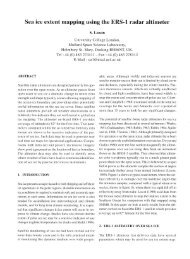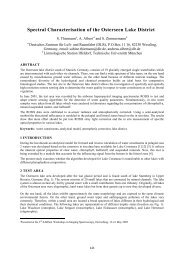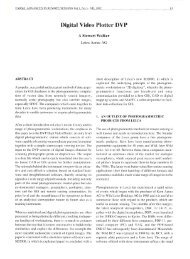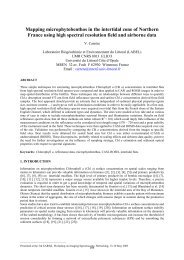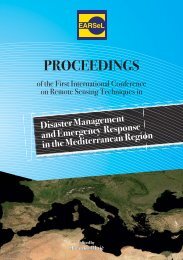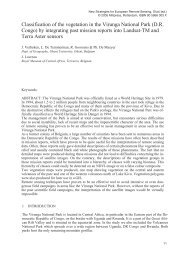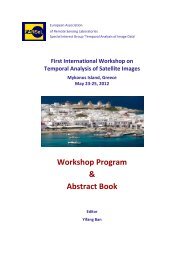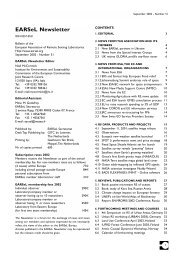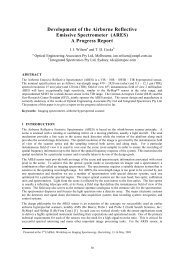- Page 3 and 4:
Proceedings of the VII Internationa
- Page 5:
SCIENTIFIC COMMITTEE Olivier Arino
- Page 8 and 9:
Analysis of human-caused wildfire o
- Page 10 and 11:
Monitoring post-fire vegetation reg
- Page 12 and 13:
10 Agency, Italian National Forestr
- Page 15:
I PRE-FIRE PLANNING AND MANAGEMENT
- Page 18 and 19:
16 I - PRE-FIRE PLANNING AND MANAGE
- Page 20 and 21:
18 I - PRE-FIRE PLANNING AND MANAGE
- Page 23 and 24:
USING SPATIAL ANALYSIS TO CHARACTER
- Page 25 and 26:
Using spatial analysis to character
- Page 27 and 28:
Abstract: Fire is the major stand-r
- Page 29 and 30:
Fire and climate change in Boreal F
- Page 31 and 32:
Fire and climate change in Boreal F
- Page 33 and 34:
Fire and climate change in Boreal F
- Page 35 and 36:
PROJECTING FUTURE BURNT AREA IN THE
- Page 37 and 38:
Projecting future burnt area in the
- Page 39 and 40:
Projecting future burnt area in the
- Page 41 and 42:
MULTISCALE CHARACTERIZATION OF SPAT
- Page 43 and 44:
Multiscale characterization of spat
- Page 45:
Multiscale characterization of spat
- Page 48 and 49:
46 I - PRE-FIRE PLANNING AND MANAGE
- Page 50 and 51:
48 I - PRE-FIRE PLANNING AND MANAGE
- Page 52 and 53:
50 I - PRE-FIRE PLANNING AND MANAGE
- Page 54 and 55:
52 I - PRE-FIRE PLANNING AND MANAGE
- Page 56 and 57:
54 I - PRE-FIRE PLANNING AND MANAGE
- Page 59 and 60:
CLASSIFICATION OF SITE AND STAND CH
- Page 61 and 62:
Classification of site and stand ch
- Page 63 and 64:
Classification of site and stand ch
- Page 65 and 66:
FUEL MOISTURE CONTENT ESTIMATION: A
- Page 67 and 68:
Fuel moisture content estimation: a
- Page 69:
Fuel moisture content estimation: a
- Page 72 and 73:
70 I - PRE-FIRE PLANNING AND MANAGE
- Page 74 and 75:
72 I - PRE-FIRE PLANNING AND MANAGE
- Page 77 and 78:
FUEL MODEL MAPPING USING IKONOS IMA
- Page 79 and 80:
Fuel model mapping using ikonos ima
- Page 81 and 82:
FIRST STEPS TOWARDS A LONG TERM FOR
- Page 83 and 84:
First steps towards a long term for
- Page 85:
3 - Conclusion and further research
- Page 88 and 89:
86 I - PRE-FIRE PLANNING AND MANAGE
- Page 90 and 91:
88 I - PRE-FIRE PLANNING AND MANAGE
- Page 93 and 94:
FUEL MOISTURE CONTENT ESTIMATION BA
- Page 95 and 96:
3 - Results Fuel moisture content e
- Page 97 and 98:
CYBERPARK PROJECT: MULTITEMPORAL SA
- Page 99 and 100: Cyberpark project: Multitemporal sa
- Page 101 and 102: REMOTE SENSING-BASED MAPPING OF FUE
- Page 103 and 104: Remote Sensing-based Mapping of fue
- Page 105 and 106: ASSESSING CRITICAL FUEL PARAMETERS
- Page 107 and 108: Assessing critical fuel parameters
- Page 109: II VALIDATION OF RS PRODUCTS FOR FI
- Page 112 and 113: 110 II - VALIDATION OF RS PRODUCTS
- Page 114 and 115: 112 II - VALIDATION OF RS PRODUCTS
- Page 117 and 118: RELATIONSHIPS BETWEEN COMBUSTION PR
- Page 119 and 120: Relationships between combustion pr
- Page 121: Relationships between combustion pr
- Page 124 and 125: 122 II - VALIDATION OF RS PRODUCTS
- Page 126 and 127: 124 II - VALIDATION OF RS PRODUCTS
- Page 129 and 130: OPERATIONAL USE OF REMOTE SENSING I
- Page 131 and 132: Operational use of remote sensing i
- Page 133: Operational use of remote sensing i
- Page 136 and 137: 134 II - VALIDATION OF RS PRODUCTS
- Page 138 and 139: 136 II - VALIDATION OF RS PRODUCTS
- Page 141 and 142: GLOBAL MONITORING OF THE ENVIRONMEN
- Page 143 and 144: Global monitoring of the environmen
- Page 145: Global monitoring of the environmen
- Page 148 and 149: 146 II - VALIDATION OF RS PRODUCTS
- Page 153 and 154: DAILY MONITORING OF PRE-FIRE VEGETA
- Page 155 and 156: Daily monitoring of pre-fire vegeta
- Page 157 and 158: THE GLOBAL MODIS BURNED AREA PRODUC
- Page 159 and 160: The global MODIS burned area produc
- Page 161: III FIRE DETECTION AND FIRE MONITOR
- Page 164 and 165: 162 III - FIRE DETECTION AND FIRE M
- Page 166 and 167: 164 III - FIRE DETECTION AND FIRE M
- Page 169 and 170: REAL-TIME MONITORING OF THE TRANSMI
- Page 171 and 172: Real-time monitoring of the transmi
- Page 173 and 174: NOAA’S OPERATIONAL FIRE AND SMOKE
- Page 175 and 176: Noaa’s operational fire and smoke
- Page 177 and 178: SYSTEM FOR EARLY FOREST FIRE DETECT
- Page 179 and 180: 3 - Result in Germany System for ea
- Page 181: References System for early forest
- Page 184 and 185: 182 III - FIRE DETECTION AND FIRE M
- Page 186 and 187: 184 III - FIRE DETECTION AND FIRE M
- Page 189 and 190: ADVANCING THE USE OF MULTI-RESOLUTI
- Page 191 and 192: Advancing the use of multi-resoluti
- Page 193: Advancing the use of multi-resoluti
- Page 196 and 197: 194 III - FIRE DETECTION AND FIRE M
- Page 198 and 199: 196 III - FIRE DETECTION AND FIRE M
- Page 200 and 201:
198 III - FIRE DETECTION AND FIRE M
- Page 203:
IV BURNED LAND MAPPING, FIRE SEVERI
- Page 206 and 207:
204 IV - BURNED LAND MAPPING, FIRE
- Page 208 and 209:
206 IV - BURNED LAND MAPPING, FIRE
- Page 211 and 212:
Abstract: The aim of this paper is
- Page 213 and 214:
Burnt area index using MODIA and AS
- Page 215 and 216:
4 - Conclusions Burnt area index us
- Page 217 and 218:
SATELLITE DERIVED MULTI-YEAR BURNED
- Page 219 and 220:
Satellite derived multi-year burned
- Page 221:
Satellite derived multi-year burned
- Page 224 and 225:
222 IV - BURNED LAND MAPPING, FIRE
- Page 226 and 227:
224 IV - BURNED LAND MAPPING, FIRE
- Page 229 and 230:
MODIS REFLECTIVE AND ACTIVE FIRE DA
- Page 231 and 232:
3 - Methodology and results MODIS r
- Page 233:
MODIS reflective and active fire da
- Page 236 and 237:
234 IV - BURNED LAND MAPPING, FIRE
- Page 238 and 239:
236 IV - BURNED LAND MAPPING, FIRE
- Page 240 and 241:
238 IV - BURNED LAND MAPPING, FIRE
- Page 242 and 243:
240 IV - BURNED LAND MAPPING, FIRE
- Page 245 and 246:
SOME NOTES ON SPECTRAL PROPERTIES O
- Page 247 and 248:
Some notes on spectral properties o
- Page 249 and 250:
MONITORING POST-FIRE VEGETATION REG
- Page 251 and 252:
Monitoring post-fire vegetation reg
- Page 253:
Monitoring post-fire vegetation reg
- Page 256 and 257:
254 IV - BURNED LAND MAPPING, FIRE
- Page 258 and 259:
256 IV - BURNED LAND MAPPING, FIRE
- Page 261 and 262:
Abstract: SAR data from a test site
- Page 263 and 264:
Backscatter properties of x- and c-
- Page 265:
6 - Conclusions Backscatter propert
- Page 268 and 269:
266 IV - BURNED LAND MAPPING, FIRE
- Page 270 and 271:
268 IV - BURNED LAND MAPPING, FIRE
- Page 273 and 274:
CORRECTION OF TOPOGRAPHIC EFFECTS I
- Page 275 and 276:
Correction of topographic effects i
- Page 277 and 278:
Correction of topographic effects i
- Page 279 and 280:
BURNED AREAS MAPPING BY MULTISPECTR
- Page 281 and 282:
Burned areas mapping by multispectr
- Page 283 and 284:
Burned areas mapping by multispectr
- Page 285 and 286:
4 - Conclusions Burned areas mappin
- Page 287 and 288:
Abstract: In this paper NDVI VEGETA
- Page 289 and 290:
Post Fire vegetation recovery estim
- Page 291:
Post Fire vegetation recovery estim
- Page 294 and 295:
292 FORTUNATO G. pag. 191 FRENCH N.
- Page 296:
Finito di stampare nel mese di agos



